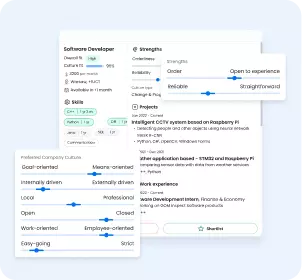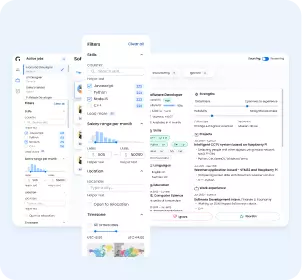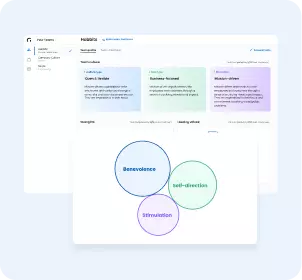Your personalized recruitment assistant
Hire or get hired as a recruiter
A free, anonymous job search to save you time landing remote, tech and startup recruiter jobs.
Create a profile, share what you're looking for, and get hired for culture fit.
Get access to our freelance, in-house and agency recruitment tools.
Used by teams inside growth startups and brands in the US & Europe
Anonymous job search for recruiters
1
Sign up and fill out your anonymous profile
2
Take our assessments to discover your fit
3
Share your preferences and what you're looking for
4
Companies contact you directly
Why Gyfted?
Gyfted lets you search for opportunities both as an active and as a passive candidate. Our service is designed by recruiters, UX designers and psychometricians.
How do I get offers?
You can apply for any roles you see on our job feed, & recruiters can reach out to you directly and request to get matched (connected) — you take it from there!
Is my profile visible?
Your profile is anonymous to provide you the safety and ease of the way job search should exist, without the unconscious biases impacting you negatively, or your employer seeing your profile.
Remote jobs for startuprecruiters, technicalrecruiters, talentsourcers
Remote jobs for startup
recruiters, technical
recruiters, talent
sourcers
Find relevant full-time and part-time roles in recruiting with agencies and companies in remote-friendly industries across states, countries and time zones.
Join our talent pool for technical, remote and startup recruiters and get matched to companies. We curate and aggregate recruiter jobs for you in Gyfted’s job feed that you can search and apply to directly, and anonymously (with unconscious bias eliminated!) via Gyfted, to increase your chances of landing an interview!
Find recruiting roles or a remote position sourcing talent easily by creating a job seeker profile, completing our assessments, and applying for recruiting jobs - full-time recruiter opportunities, talent acquisition roles, remote talent sourcer jobs, HRBP jobs, and so forth.
Job matching for culture fitLand jobs for role and culture fit/add by joining Gyfted’s recruiter talent pool
Get matched to jobs and teams that fit you around culture fit and role fit. We leverage your profile to help place you in roles that fit you. We give you specific feedback after each step. Our tools are useful for self-development and personal growth to help you discover yourself as you progress or switch in your career.
Recruiter layoffs are cyclical and recruiters are always at highest risk of layoff during hiring freezes. Our reverse job board functions like resume distribution services and a job matching platform. What’s key is that Gyfted keeps your profile anonymous and the recruiting process unbiased.
Job search that works
Apply once, get many matches
Tell us what you like, take assessments and apply, save, or skip any role. Your job matches improve as you use Gyfted.
Double your chances per job
You can apply directly as well as via Gyfted. This doubles your application and chance to get hired.
Find your dream job
Stop the endless scrolling to get in front of roles that fit you, and have recruiters apply to you!
Candidate testimonials 🥰
Great stuff! It was a pleasure to be matched by Gyfted. I enjoyed the process and experience including liasing with Gyfted’s Talent Partner.
Adam
UX/UI Designer hired at high growth VR furniture design startup
This was a really fast, unstressful and professional recruitment process - I wholeheartedly confirm as a recruiter myself :)
Laura
Sr IT Recruiter hired at fast growing big data infrastructure startup
I loved how smooth and simple the experience of applying was. And the typo in “I don’t care about making mistkes” was brilliant and funny lol!
Michael
Coding Bootcamp grad
Thanks for helping me find a job! I enjoyed the interactive assessment process and fast scheduling of interviews.
Sabrina
Business Development Manager hired at AI NLP startup
The recruitment process through Gyfted was transparent and efficient. I am very satisfied!
Wiola
Market Analyst at leading global financial institution
Find recruiter jobs
Tech recruiting jobs
Find and hire tech talent - software engineers, data analysts, data scientists - for companies in and outside of tech.
Startup recruiting jobs
Find and hire unique talent for startups. It’s worth noting that you might prefer consumer or enterprise startups.
HR Business Partners
HRBPs collaborate with business leaders (executives, team leaders) to align HR strategies and hire talent for fit.
Remote Sourcer
Proactively find potential candidates for open roles by actively sourcing passive candidates.
Entry level recruiting
Junior recruiters are often focused on entry-level employees and graduate recruitment.
Talent Coordinator Remote
Lead and manage the entire talent acquisition process.
Recruitment tools for recruiters, managers and founders
Solve your recruiting pains and save time using our talent matching solution. Match business, remote and IT talent to your needs. Use our recruitment tools to find talent by accessing pre-screened tech and sales candidates in any talent pool.
Get recruited for a recruiting job
Employers view your anonymous profile on our talent platform.
Frequently asked questions
Is recruiting a good job?
It’s a “people business”. Recruiting can be a rewarding job for those who enjoy helping others find employment, fulfillment, and helping businesses find qualified candidates. It can also be challenging and demanding, as recruiters often work to tight deadlines and need to be able to quickly assess and screen job candidates. There’s much cyclicality to this role related to seasonal hiring and business cycles. However, above all the answer depends on your preferences and skills - and this is where Gyfted helps you understand what makes you tick and what you’re good at!
How to land a recruiting job?
There are numerous things you can do to land a job in recruiting:
1. Gain experience: many recruiters have a background in Recruiting & Talent or sales. Many also have studied psychology and worked in a related field.
2. Develop a relevant network: networking is key in recruiting, as many jobs are filled through personal connections, referrals and the ‘hidden job market;. Attend industry events, join the LInkedIn groups that interest you (and be active in there).
3. Post on LinkedIn: develop an audience and post quality content of value to others in recruiting and potential hiring managers.
4. Get certified: some organizations offer professional certifications for recruiters, eg. Certified Professional Recruiter (CPR) or the Society for Human Resource Management-Certified Professional (SHRM-CP) certification. However, it’s less about certification, and more about your people skills, proactiveness and self-discipline
5. Tailor your resume: highlight your relevant experience and skills on your resume, and customize them to the specific job or company you are applying to. Remember that ATS use dysfunctional keyword parsing, so add relevant keywords to your CV.
6. Simply apply for jobs: look for open recruiting positions on job boards, company websites, and via your network. Although we all know that job search sucks..
7. Consider starting your own recruiting business, if you have the required knowledge and experience in the field, especially is you are good at sales and sourcing senior in-demand talent then this could be an optimal route.
How do recruiters get paid?
Recruiters usually get paid through a combination of salary and commission.
1. Salary: many recruiters are employed by companies on a full-time basis and receive a regular salary.
2. Commission: in addition to their salary, recruiters may also earn commission. Commission is typically paid when a candidate placed by the recruiter is hired by the company. The commission rate varies depending on the company and the role, but it can be a significant portion of a recruiter's overall compensation. Also commissions depend on the “outcome” ie. if the candidate remains in the job for the guarantee period, which usually ranges from one to two months.
3. Retainer: sometimes freelance or agency recruiters are hired for a specific candidate search and paid via a retainer ie. an upfront fee representing a % of the annual salary of the candidate or just a lump sum fee.
4. Recruiting agencies pay recruiters usually via a combination of salary and commission. The commission is earned on the basis of the candidate they place, the company pays a certain percentage of the candidate's first year salary to the agency.
How much do recruiters make?
Salaries of recruiters vary a lot depending on company, job category, location, recruitment model. According to Bureau of Labor Statistics (BLS) data, the median annual salary for recruiters in the United States is around $60,000. Also check out these salary figures:
1. Corporate recruiters usually earn between $45,000 and $100,000 per year, depending on experience and size of company.
2. Recruiters working for recruiting agencies earn between $30,000 and $80,000 per year.
3. Executive recruiters focus on placing high-level executives and senior talent, and typically earn between $75,000 and $150,000 per year.
These numbers are just averages, and the amount of money recruiters make can vary greatly depending on their experience, industry they work inm and above all commission comp.
How to become a remote recruiter?
Gain experience in recruiting, Recruiting & Talent, sales or a related field.
Build a professional network, as many jobs are filled through personal connections. Attend industry events, join professional organizations, and connect with people on LinkedIn.
Your English language skills have to be excellent. So develop your written and spoken English, you can go for DuoLingo and train fast there.
Discover remote recruiting positions via Gyfted. :)
Develop strong communication and interpersonal skills, learn to focus and work independently and manage time effectively. Moreover, you need to develop an ability to navigate remote communication tools and platforms - Slack, Loom, Miro, etc. and a good understanding of recruiting best practices and current trends.
Find companies that are open to hiring remote recruiters - look into job boards and Gyfted.
Consider working on short gigs on Upwork or other freelance platforms to develop some skills. Or - even better - do recruiting gigs for friends and your personal network.
How to become a technical recruiter?
Becoming a technical recruiter involves a combination of competencies, work experience, and networking:
1. Check your competencies and gain the relevant experience interning for free. Many technical recruiters start in entry-level roles eg. recruitment coordinator, to step into this job field.
2. Develop technical knowledge: read, read, read! Learning about coding (eg. go through online courses, take a bootcamp - “speak” the language of recruiters and technical staff to an extent!). For sure check out FreeCodeCamp
.3. Build a network of contacts in the industry, go to events, join social groups, and engage with technical people on social media. Don’t be awkward or pushy, be natural!
4. Develop your recruiting skills ie. sourcing, interviewing, and assessing candidates. You can use Gyfted’s screening solution to aid your work.
5. Consider specializing in a certain programming/technical area, geography, or industry, eg. cybersecurity. Specializing can help you become an expert in an area and build a strong reputation.
6. Stay organized and disciplined.
How to get a job in recruitment?
Take these steps to increase your chances of getting a job in talent acquisition:
- acquire relevant skills and education: to increase your chances of landing a job in talent acquisition, it's essential to acquire the relevant skills and education. Consider obtaining certifications like the Professional in Human Resources (PHR) or the Society for Human Resource Management (SHRM) Certified Professional (SHRM-CP) to add credibility to your resume. Remember, though, that skills and experience matter MUCH more than a degree or certification.
- gain experience: gaining relevant experience is an important step in getting a job in talent acquisition. Consider working in a related field, such as recruitment, Recruiting & Talent administration, or customer service. And quality is more important than quantity.
- build out your network: join professional associations, attend job fairs and networking events, and buld relationships with other professionals in the industry. Join online LinkedIn communities to expand your network and build relationships. Be authentic and helpful/valuable!
- tailor your resume: to the specific job you're applying for can increase your chances of getting hired. Highlight your relevant skills and experience, use numbers and use-cases/examples. Be authentic and show your enthusiasm for the position. You can use Gyfted’s Personality Resume Builder for this.
- apply to open positions that match your skills and experience on company websites, job boards, and social media. Do not get discouraged even though job search sucks..
- prepare for interviews: research the company and role, be ready to answer common behavioral questions related to talent acquisition. You should be prepared to discuss how you handle difficult hiring situations, how you build relationships with hiring managers, and how you measure the success of your hiring efforts. Ask questions at the end (prepare them)
- follow up: after the interview send a thank-you note!
How to recruit talent for a startup?
Recruiting for a startup is challenging as you’re competing with larger and richer companies:
1. Define your company culture and values: it is extremely important to have a clear understanding of your company culture and values to attract like-minded individuals who share your vision and mission. You can use Gyfted’s team culture measures to figure this out, and you can use our recruitment software to measure candidate culture fit!
2. Identify the roles you need to fill eg. software engineers, marketers, SDRs, etc.
3. Leverage your personal and professional network to spread the word about job openings in your startup. Ask for referrals, inspire people, and don’t sell bs!
4. Post job openings on job boards to reach a larger pool of candidates.
5. Attend job fairs and networking events.
6. Offer competitive compensation and benefits, but above all compete on flexibility (remote work, work from home, hybrid work setups) and culture - this is one fundamental advantage small companies and startups can easily offer vs large, bureaucratic organizations.
7. Emphasize the potential for growth and impact around personal and professional development that comes with being part of a nimble, dynamic company.
8. Use creative recruitment tactics, eg. coding challenges or hackathons, to attract top talent to your startup.
How to start a recruitment agency?
It might sound hard, but above all you need to be an entrepreneur at heart and/or a recruiter with relevant experience and ideally some existing relationships and customers you can start working for to kick-start! These steps would make sense in starting a recruitment business:
1. Figure out your target market/audience/specialization eg. sales recruitment.
2. Get a draft business plan, write down your mission, vision, goals, services, how you want to charge now and later.
3. Set up a business (LLC, sole proprietorship for starters might work too).
4. Get the necessary licenses and permits: this varies state to state and country to country.
5. Get a team/cofounders (this is up to you of course).
6. Establish relationships with clients: network, build relationships in social media.
7. Build relationships with candidates: get a database going, leverage marketing.
8. Get the tech that makes you productive eg. Asana, Google Workspace, LinkedIn, Gyfted’s Matching Solution.
9. Develop contracts and agreements and get the help of a lawyer on this.
10. Launch. No fanfares are needed -- just go to market with it.


